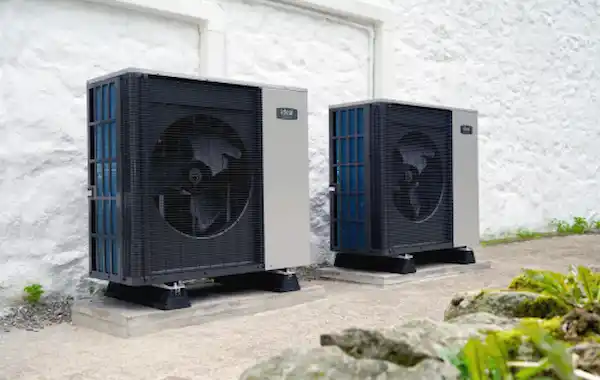02 July 2024
|
By Jack Hill, Secon Renwables
In the evolving landscape of renewable energy, air source heat pumps (ASHPs) have surfaced as a promising solution for efficient heating and cooling in residential and commercial spaces. Despite significant advancements in heat pump technology over the past two decades, persistent myths about their performance and cost-effectiveness deter many installers and homeowners from adopting this eco-friendly option. This article delves into the truth behind prevalent misconceptions surrounding heat pump technology, offering clarity on their capabilities and dispelling doubts. By unravelling these myths, we aim to empower individuals with accurate information, encouraging a more informed approach to embracing ASHPs as a sustainable heating and cooling solution. Join us as we navigate through the realities and potentials of heat pump technology, paving the way for a greener and more efficient future in energy consumption.
1 ‘Heat Pumps won’t keep you warm
According to a recent UK survey commissioned by Nesta, over 80% of participants expressed contentment with the performance of their heat pumps in delivering both space and hot water heating, a satisfaction level similar to households using gas boilers, as noted by Nesta. Moreover, a pan-European survey conducted in 2022 unveiled that 81% of respondents reported an elevated level of comfort after installing a heat pump. If designed and installed correctly, heat pumps can provide the same levels of comfort as a fossil fuel heating system, or more. These findings underscore the widespread satisfaction and comfort benefits associated with heat pump usage, highlighting their effectiveness in meeting heating requirements and improving overall living conditions.
2 ‘Heat Pumps only work in highly insulated buildings’
There's a common misconception that heat pumps demand impeccably insulated structures to operate effectively. However, the reality is that heat pumps can perform well in any building if appropriately sized, designed, and installed. During colder weather, buildings naturally lose heat through walls, windows, and the roof. Inadequate insulation exacerbates this heat loss, requiring a higher heat input to maintain a consistent indoor temperature. Consequently, in poorly insulated homes, a larger heat pump is necessary, similar to the need for a larger gas boiler to meet the required heat input. While sufficient insulation can improve the efficiency of a heat pump system by reducing heat loss, modern heat pumps are adaptable to varying insulation levels. They can still provide efficient heating and cooling solutions, even in less insulated buildings. Therefore, it's essential to consider multiple factors beyond insulation when assessing the suitability of a heat pump for a specific property.
3 ‘Heat Pumps devalue Properties’
There's a prevalent misconception that the installation of a heat pump can decrease the value of your property. Research conducted in the UK indicates that installing a heat pump could potentially increase the value of an average home by approximately 1.7% to 3.0%. Given the average UK house price as of December 2023, estimated at around £285,000, this implies a price uplift ranging from £4,800 to £8,600. Such a boost represents a significant portion of the initial investment needed for heat pump installation. This highlights the potential financial benefits homeowners can reap by embracing heat pump technology, not only in terms of energy savings but also in enhancing property value.
4 ‘Heat Pumps don’t work when it’s cold’
The Nordic countries of Sweden, Norway, and Finland are renowned for their chilly climates. Interestingly, they also boast the highest per capita heat pump sales in Europe. With over 40 heat pumps per 100 households in each nation, they top global charts in heat pump adoption. This trend highlights the effectiveness of heat pumps in addressing cold weather challenges and underscores the region's commitment to sustainable heating solutions. It also suggests that despite the harsh climate, heat pumps offer a viable and popular option for heating in these countries.
Some concerns arise regarding the performance of heat pumps in freezing temperatures. However, they actually perform exceptionally well in such conditions. Heat pumps maintain high efficiency even in sub-zero temperatures, outperforming gas boilers by more than double. While the coefficient of performance (COP) of heat pumps may decrease as the outside temperature drops, it remains notably high. Unlike fossil fuel boilers, which operate at around 85% efficiency, heat pumps utilize electricity to extract additional heat from the outside air or ground. This process typically yields at least 2 units of heat for each unit of input, resulting in a COP of 2 or higher, equating to efficiencies of 200%, 300%, or more, meaning you can stay nice and toasty even if the outside is bitter.
5 ‘Heat Pumps are too difficult to install’
Although installing a heat pump is undoubtedly more intricate than setting up a standard boiler, it becomes manageable under the supervision of a skilled heat pump engineer. Many challenges arise when unqualified individuals attempt installations. These individuals may purchase a heat pump from a wholesaler without fully understanding its complexities. Consequently, errors occur during installation, compounded by a failure to adhere to the correct design protocols or conduct necessary thermal assessments beforehand. These missteps show the importance of acquiring adequate training qualifications and purchasing a heat pump from a reliable renewables supplier that has a strong technical support system.
Summary
The misconceptions surrounding heat pumps are outdated, given the advancements in technology. Modern heat pumps have undergone significant development, effectively meeting the heating and cooling needs of homeowners and exceeding expectations. Concerns regarding their ability to maintain warmth in homes, noise levels, and performance in cold climates are no longer valid. Homeowners report high levels of satisfaction, coupled with substantial improvements in efficiency, showcasing the reliability and comfort provided by heat pump technology. Consequently, homeowners and installers can confidently adopt heat pumps as a sustainable and effective solution for their heating and cooling requirements, assured by their proven performance and reliability, as well as improved and more accessible technical support to help with installations.








